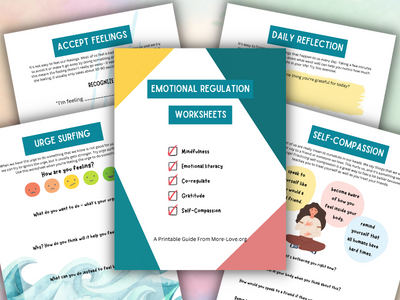
As parents, we naturally want answers when things go wrong with our children. We want to know why something bad happened, and how we can fix it. We are willing to quit our jobs, move across the country, lose friendships, and sacrifice every ounce of our energy to help our children get better when they are ill.
Because of this natural desire, there is a never-ending quest in the eating disorder parent community to find out how we can cure our children of this terrible affliction. And, when we meet with experts in the field, what we really want to know is: will my child get better?
But these are not questions that will help us in the long term, mainly because every single eating disorder is an anomaly. There is no single eating disorder. Each of our children who has an eating disorder is experiencing their very own version of an eating disorder.
Emotional Regulation Worksheets
Give these printable worksheets to grow more confident, calm and resilient and feel better, fast!
- Self-Esteem
- Self-Regulation
- Mindfulness
- Calming strategies
Dr. Kevin B. Jones is a surgeon specializing in a rare group of cancers called sarcomas, which, like eating disorders, have no proven cure. He says that when it comes to sarcomas, “doctors, no matter how many questions they ask, definitely don’t have all the answers.”
As with eating disorders, parents approach cancer surgeons with hope, seeking predictions about the likelihood of recovery. But Dr. Jones recognizes that he does not have the answers to cure every patient, and that curiosity and humility are required for every single case.
“Every one of my patients is an outlier – is an exception,” he says during a TED Talk.
Dr. Jones has a very important message for his patients: “look, I don’t have a black and white answer for you, because it doesn’t exist. Anybody who gives you a black and white answer is either bluffing or is making up some part of it.”
Instead of looking for the right answer, Dr. Jones suggests we ask the correct questions. “We cannot really say, with science, what is going to happen,” he says. “I really think that the key is asking the right questions. What can I do, what can I choose?”
And this may be the best thing we can do for our children who have eating disorders. Instead of seeking answers for why this happened or when it will be over, maybe we can instead focus in on what we can reasonably do and the choices we can actually make while our child is working through his or her own unique eating disorder.
Just like sarcomas, for now, there is no single cure for eating disorders. And yet, many eating disorders are cured.
Emotional Regulation Worksheets
Give these printable worksheets to grow more confident, calm and resilient and feel better, fast!
- Self-Esteem
- Self-Regulation
- Mindfulness
- Calming strategies

Ginny Jones is the founder of More-Love.org, and a Parent Coach who helps parents who have kids with disordered eating and eating disorders. Combining science, compassion, and experience coaching hundreds of families, she helps parents understand what’s going on with their kids’ eating behaviors and teaches them the science-backed skills to heal kids’ relationship with food, improve their body image, and feel better about themselves, their relationships, and life in general.
Ginny has been researching and writing about eating disorders since 2016. She incorporates the principles of neurobiology and attachment parenting with a non-diet, Health At Every Size® approach to health and recovery.

